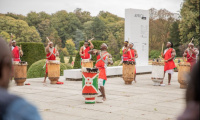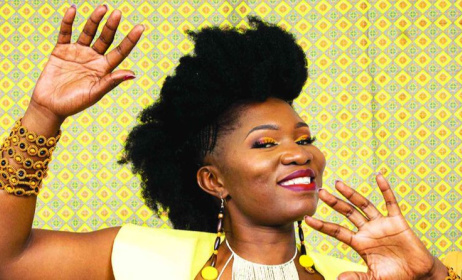Google Doodle celebrates Zimbabwe's mbira
Google Doodle today featured Zimbabwe's mbira to mark the start of the southern African country's Culture Week.
 Vimbai Zimuto.
Vimbai Zimuto.
The mbira, classified as a lamellophone by musicologists, is an ancient instrument of the Shona people. It is often played at religious ceremonies, weddings, and other social gatherings.
Apart from acquainting the world to the beautifully sounding 'thumb piano', Google Doodle also featured the music of Zimbabwean mbira greats Chiwoniso Maraire, Forward Kwenda and Linos Magaya. While taking users on an interactiver journey of the instrument, Google Doodle played such songs as ‘Nhemamusasa’ by Maraire, ‘Tireva’ by Kwenda and ‘Bangiza’ by Magaya.
Kwenda told Music In Africa that he was happy Google had decided to celebrate the mbira. “This will help many people to play and learn the mbira,” he said. “I look forward to positive feedback from this initiative. Our instrument is sacred and I'm excited to see how it will connect with people spiritually and emotionally. The mbira resembles African strength and endurance, and it has been around for thousands of years."
UK-based Zimbabwean musician Linos Magaya said: "I thank Google Doodle for featuring my music. They are doing awesome work to keep mbira on a global stage."
Netherlands-based Zimbabwean mbira player and former Oliver Mtukudzi band member Vimbai Zimuto said semantics mattered when African musicial cultures were being presented to the world.
“As a person who plays the mbira on big stages here in Europe, many people ask if it’s a thumb piano and I say, ‘No, it's the mbira’. I was proud that Google recognised our own national, cultural and ethnic pride by its original name, mbira.”
Mauritius-based Zimbabwean mbira player and music teacher Carmen Nelly Hwarari Mutengo echoed Zimuto’s sentiments: “I think it’s a great thing and it was done so well. I however wish that we, the custodians, do a lot more to celebrate these instruments as well as traditions, which represent our culture, heritage and who we are. I am thrilled that they referred to it with its proper name and not thumb piano or finger piano.”



























Comments
Log in or register to post comments